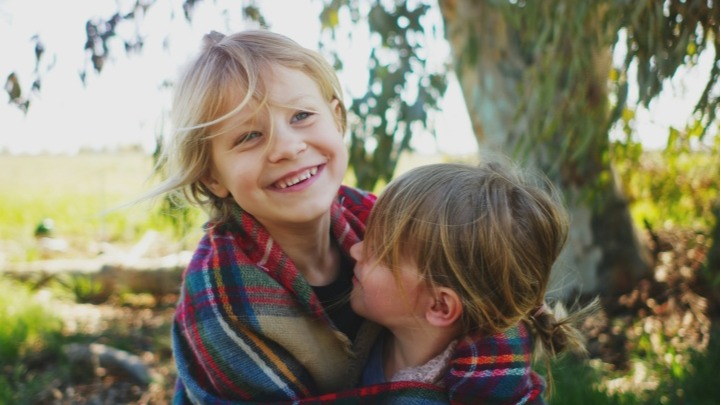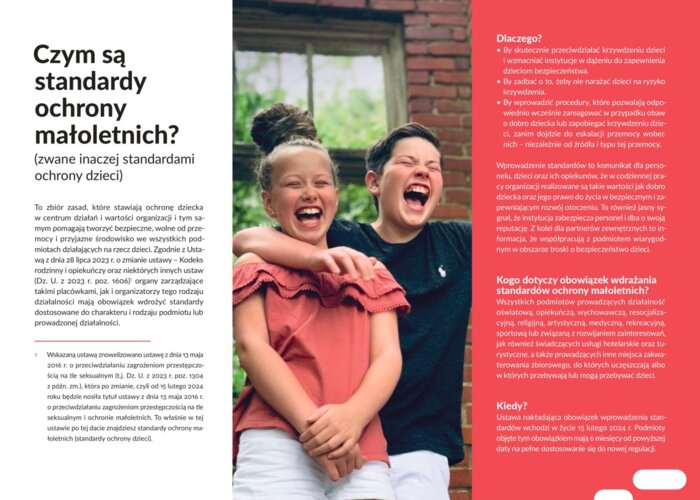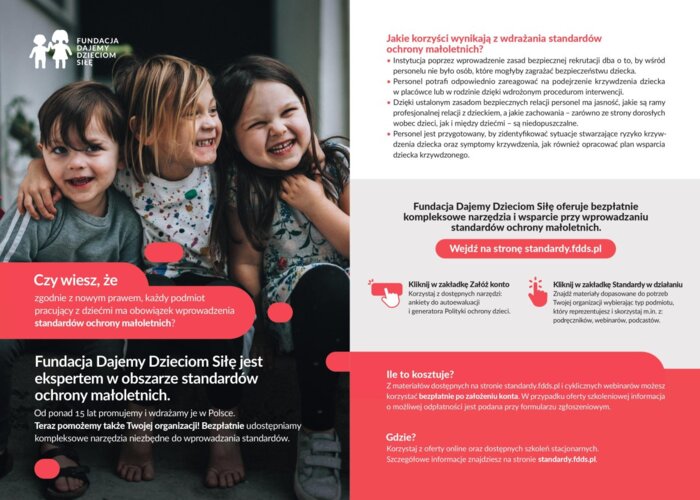
Standards for the Protection of Minors
Standards for the Protection of Minors
§ 1. Preamble
Considering the obligation resulting from the Act of May 13, 2016, on counteracting threats of sexual offenses and protecting minors, to implement standards for entities providing hotel and tourist services, as well as operating other collective accommodation places, in the scope necessary to ensure the protection of minors, and recognizing the important role of business in ensuring respect for Children's rights, especially the right to protect their dignity and freedom from all forms of harm, the hotel adopts this document as a template for standards, principles, and procedures in case of suspicion that a Child staying at the hotel is being harmed and to prevent such threats.
§ 2. General provisions
1. The hotel operates with the highest respect for human rights, especially the rights of Children as individuals particularly vulnerable to harm.
2. The hotel acknowledges its role in conducting socially responsible business and promoting desirable social attitudes.
3. The hotel particularly emphasizes the legal and social obligation to notify law enforcement authorities of any suspected crime against Children and commits to training its staff in this regard.
4. The hotel commits to educating staff about circumstances indicating that a Child staying at the facility may be harmed, and about ways to respond quickly and appropriately to such situations.
§ 3. Definitions
1. Child – any person under 18 years of age;
2. Harm to a Child – committing a prohibited or criminal act causing harm to a Child by any person, including a member of staff, or threatening the welfare of a Child, including neglect. All crimes that can be committed against adults can also be committed against Children, in addition to crimes exclusively committed against Children (e.g., sexual exploitation under Article 200 of the Penal Code). Due to the specifics of tourist facilities, where it is easy to obtain seclusion, the most common crimes that may occur on their premises are crimes against sexual freedom and morality, in particular rape (Article 197 Penal Code), sexual exploitation of incapacity and helplessness (Article 198 PC), sexual exploitation of dependency or critical situation (Article 199 PC), sexual exploitation of a person under 15 years of age (Article 200 PC), grooming (seducing a minor through remote communication means – Article 200a PC);
3. Child Guardian – a person authorized to represent the Child, especially the parent or legal guardian. According to the Standards, a foster parent is also considered a guardian;4. Staff – a person employed by the hotel based on an employment contract, civil law contract, or a member of an organization.
§ 4. Principles of identifying a Child staying at the hotel and their relationship to an adult they are with.
1. When accepting a Child for a stay at the hotel, whenever possible, the Child and their relationship with the adult they are with should be identified.
2. Identification of the Child by the reception staff is mandatory in unusual and suspicious situations indicating a risk of harm to the Child.
3. To identify the Child and their relationship to the adult they are with, you should:
1) ask for the Child's identity and their relationship to the adult who arrived or is staying at the hotel with them. You may request the Child’s ID or other documents confirming the adult’s right to care for the Child (e.g., civil status certificate, court ruling). If an ID is not available, you can ask for the Child’s details (first name, last name, address, PESEL number);
2) if documents proving the relationship between the Child and adult are lacking, ask both the adult and the Child about this relationship;
3) if the adult is not the Child’s Guardian, ask if they have a document consenting to the joint trip of the adult with the Child (e.g., a written statement of consent from at least one parent/legal guardian);
4) if the adult does not have the Guardians' consent document, ask for their phone number to call and confirm the Child’s stay at the hotel with the adult’s knowledge and consent.
4. If the adult resists showing the Child’s document or indicating the relationship, explain that the procedure serves to ensure the safety of Children using the hotel and that this obligation results from generally applicable law.
5. If the conversation does not dispel doubts about the adult’s suspicion and intention to harm the Child, discreetly notify the Reception Manager or a person appointed by them. To avoid raising suspicion, you may, for example, cite the need to use equipment behind the reception and ask the adult to wait with the Child in the lobby, restaurant, or another area.
6. From the moment doubts arise, both the Child and the adult should be under continuous staff supervision and not left alone.
7. The Reception Manager or their designee makes the decision to notify the police or, if in doubt, takes over the conversation with the suspicious adult to obtain further explanations.
8. If the conversation confirms the conviction about an attempt or commission of a crime against the Child, the supervisor notifies the police. Then, the rules applicable to circumstances indicating harm to a Child apply.
9. If staff from other organizational units (e.g., cleaning service, room service, bar and restaurant staff, security) witness unusual or suspicious situations, they should promptly inform the Hotel Director or a person appointed by them, who will decide on appropriate actions.
§ 5. Principles and procedures for responding in case of justified suspicion that the welfare of a Child present on the hotel premises or using the hotel services is threatened.
1. Staff have knowledge and, as part of their duties, pay attention to risk factors and symptoms of Child abuse.
2. Staff are obligated to immediately inform the Hotel Director of any suspicion of Child abuse.
3. Intervention is conducted by the Hotel Director, who may appoint another person to this task unless the staff’s actions are sufficient.
4. Justified suspicion of Child abuse occurs when:
1) the Child reveals to the staff the fact of abuse,
2) staff observe abuse,
3) the Child has signs of abuse (e.g., scratches, bruises), and when asked responds inconsistently and/or chaotically or becomes embarrassed, or other circumstances indicating abuse arise, e.g., finding pornographic materials involving Children in an adult's room;
4) the Child's Guardian or a third party reports abuse.
5. In case of suspicion that a Child is abused by another Child staying at the hotel (e.g., during group activities), a conversation should be conducted with the suspected Child (ideally with their Guardian present) and the Guardian, as well as separately with the Child being abused (ideally with their Guardian) and the Guardian.
6. If there is suspicion that a Child experiences violence from another Child resulting in health damage, sexual exploitation, or life threat, or repeated physical or psychological violence, or other disturbing behaviors, the intervening person is additionally obliged to file a report on the possibility of a crime or notify the nearest family court.
7. In case of suspicion of abuse by the Child's Guardian/person staying with them in the hotel in the form of:
1) violence causing health damage, sexual exploitation, and/or life threat, staff must ensure the Child's safety by separating them from the suspected Guardian and notify the police at 112 or 997;
2) other crimes, the intervening person must notify the police or prosecutor by filing a report on the possibility of a crime;
3) single instances of other physical violence (e.g., slaps, pushing, shoving), psychological violence (e.g., humiliation, discrimination, ridicule), or other disturbing behaviors (e.g., shouting, inappropriate comments), staff must ensure the Child’s safety, conduct a conversation with the Guardian/suspected person; in cases of repeated violence, the intervening person must notify the competent social welfare center and simultaneously file a family court request for family situation review.
8. If a staff member suspects that a Child is harmed by third parties (including staff) in forms of:
1) violence causing health damage, sexual exploitation, or life threat, staff must ensure the Child's safety, separate them from the suspected person, and notify the police at 112 or 997;
2) other crimes, staff must ensure the Child's safety, separate them, and notify the police or prosecutor in writing by filing a crime report;
3) single instances of other physical or psychological violence, staff must ensure safety, separate the Child, and the intervening person must terminate cooperation with the offending person;
4) other disturbing behaviors (e.g., shouting, inappropriate comments), staff must ensure the Child's safety, separate them, and the intervening person must hold a disciplinary conversation and terminate cooperation if no improvement occurs.
9. In suspicion cases, prevent the Child and the suspected person from leaving the hotel.
10. If justified, a citizen's arrest of the suspected person may be carried out. Until police arrive, the person should be supervised by two staff members in a separate room out of sight of other Guests.
11. Always ensure the Child’s safety; the Child should be under staff supervision until police arrive.
12. In justified suspicion of a crime involving the Child's contact with the perpetrator’s biological material (semen, saliva, skin), do not allow the Child to wash or eat/drink until the police arrive, as far as possible.
13. After police take custody of the Child, secure monitoring footage and other relevant evidence (e.g., documents) related to the incident and, upon request, send copies by registered mail or deliver in person to the prosecutor or police.
14. Staff and intervening persons are obliged to prepare an official report on the incident and actions taken. The report may be written or emailed.
15. After intervention, describe the incident in the record of events threatening the welfare of Children. This record is maintained by a person appointed by the Hotel Director.
§6. Employment of persons working with Children
1. All persons working with Children must be safe for them, meaning their employment history should show no past harm to any Child.
2. Staff employed by the hotel for education, leisure, and childcare must be verified in the Register of Offenders of Sexual Crimes. Verification is done by printing search results from the Register with restricted access, which is then attached to the employee’s personnel file. Verification should be repeated annually.
3. All employees working with children, including those potentially in contact with children, should submit a declaration of no criminal record and no ongoing proceedings for acts against Children.
§ 7. Principles ensuring safe relationships between Staff and Children
1. The fundamental rule in all activities undertaken by staff is working for the Child’s good and best interest.
2. Staff treat Children with respect, considering their dignity and needs. Violence in any form towards Children is unacceptable. Staff act within applicable law, internal organizational regulations, and their competencies.
3. Staff are obliged to maintain professional relationships with Children and always consider whether their reaction, communication, or actions towards a Child are adequate, safe, justified, and fair towards other Children.
4. It is forbidden to embarrass, humiliate, ignore, or insult a Child. Staff must not shout at a Child unless it concerns the safety of the Child or others.
5. Sensitive information about a Child must not be disclosed to unauthorized persons, including other Children. This includes the Child’s image, information about their family, economic, medical, care, and legal situations.
6. Staff must assure Children that if they feel uncomfortable in any situation or behavior or words, they can tell hotel staff and expect an appropriate response and/or help.
7. Offering Children alcohol, tobacco products, or illegal substances, as well as using these in the presence of Children, is prohibited.
8. Any violent action towards a Child is unacceptable.
9. Contact with Children should occur only during working hours and relate to the staff’s duties. Inviting Children to one’s home or meeting outside working hours is forbidden. This includes contact through private communication channels (private phone, email, messengers, social media profiles).
§ 8. Final provisions
1. This policy comes into force on February 15, 2024.
2. The hotel makes the Standards available on its website and at the reception.


